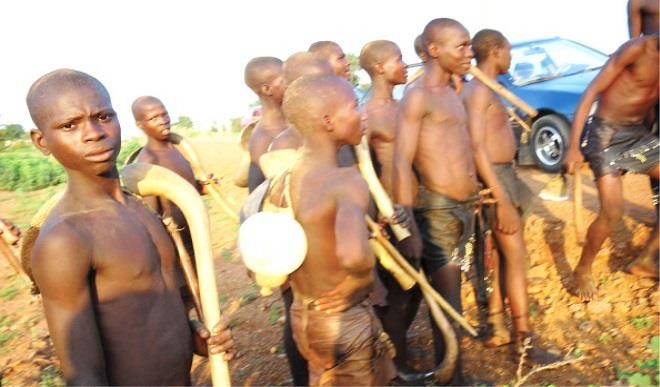
The famous marriage tradition among the Zuru people of Kebbi State, commonly known as Golmo, is said to have originated from the scripture. According to Dakarkari elders, this practice is based on the seven-year labour the Bible records Moses did for his father-in-law before he was given a wife.
In Zuru community, it is mandatory for every male adult to be initiated into Golmo, where he must work in the farm of his would be father-in-law for a period of seven years. This is the only way he will be given a wife and be respected as a member of the community.
Among the Dakarkari, any male adult who is not initiated into Golmo is not regarded as a man, and he cannot be seen to be brave and disciplined. Daily Trust on Sunday gathered that before anyone becomes a leader in Zuru community he must be scrutinised. They will mandate people to find out if he has been initiated into Golmo or not. If he is not initiated, it means he cannot lead them. The Golmo group is made of 20 to 50 adults. Every member is expected to undergo some rituals and initiations, and it must be completed during the Uhola annual festival. It is after this that he can be considered a member.
This cultural practice is unique to the Lelena, Dukawas, Kambari, Hachifawa and Fakawas. They are the five major groups practising Golmo in Zuru land. However, because of modernisation and religion, some people in Dakarkari community no longer care about the tradition, but it is still being largely practised in many Zuru communities till date.
The district head of Rikoto, Alhaji Muhammadu Shehu Bandi, traced the history of this practice to Lelena. “During the slave trade period, people were scattered. If a man was stronger than his neighbour he would get hold of him and sell him to the white man. But later, when slave trade was abolished, there was that sense of belonging and the Dakarkari people decided to come together and plan their way of life. They realised that marriage was very important, and if they must have legal children and be respected in the society, they must fashion out a way to value their marriage system. They reasoned that a wife should not be bought; instead, she should be highly respected. This was how Golmo practice came into existence. Since then, it has been the only cherished way of marriage among the Zuru people.
David Rikoto, a teacher in the community, who said he also went through the marriage practice, maintained that whoever had gone through the rituals and is eventually initiated into Golmo, is expected to be hardworking, strong, agile and brave.
“You need to see them anytime they are working in the farm. They are like tractors. You would be amazed at their speed whenever they are in their would be in-laws’ farms. Whenever they start the farm work they won’t stop until they finish it. Whether it is clearing of the farm, sowing or harvesting of crops; they are wonderful,” he said.
An elder in one of the Zuru communities at Dabai, John Yafi Dabai said, “What we are doing is what the Bible says Moses did before he was given a wife. The Golmo culture we are practising in Zuru land originated from the scripture.”
He maintained that every youth of Dakarkari origin from 15 years of age must be initiated into the cultural practice. “At 12 he will be made to undergo what we call Chino, which is the first stage of Golmo. When he is 17 he will be made to do Dato, where he will undergo another process of initiation. He will finally complete his initiation during the Uhola festival when the initiation of another group is expected to commence. After initiation they will be tested on their bravery and discipline, and they must prove that they possess these qualities. Every adult that is initiated would be asked to go to the bush to hunt for rats. They must hunt for as many rats as they could and gather them together for the elders who had completed their own initiation in their native areas. We call this Nemonloginu,” he said.
He further said there were different Golmo groups. “In Dabai we have the Danbana group, Binjosno group, Kwano group, Ono group and the Akdada group. Those who must do their Golmo initiation first are the Danbana from Dabai. They usually initiate their youths into Golmo at night where they must perform rituals and offerings to their ancestors to ask for their permission to commence the initiation. The first year of Golmo is called Yakwebni, second year is Boyini, while we call the third year Kwisemne. At this stage, adults who are considered to be brave and disciplined are given the position of elders, based on their performance in the farm. It is a disciplinary cultural organisation that makes our men to get wives. In this tradition, once a person is given a wife, any other woman he marries is bound to be under his Golmo wife and he cannot divorce her. It is our belief that when we die, it is our Golmo wives that will be our wives in heaven. Before this colonial mentality that we are witnessing today, it was only through this cultural practice that any adult in Dakarkari land could get a wife. Just like the Christian marriage, it is one man, one wife. Till today we still maintain the culture. If a woman wants to marry here, she must also do Dato, which means that she is mature to go out and marry her husband. In our land, any man who is not initiated into Golmo cannot be regarded as a man. He cannot be seen as brave and disciplined. Before anyone becomes a leader in Dakarkari culture we must find out first if he was initiated into Golmo or not.
“In our land, Golmo is a seven-year labour for a wife. Whoever is to marry is expected to farm and do all sorts of work to please his would be father-in-law. After the expiration of seven years he would be given a wife. No matter the hardship the marriage is facing, both husband and wife will have to endure it in the same way the husband endured the seven years of Golmo. It is a pride in Zuru. It depicts discipline, endurance and bravery. In this community, farming and hunting are ways of life.
“It is because of these things that the Dakarkari man does not fear anything as far as military training is concerned. He is already used to it through his initiation into Golmo. Even if it is in war, there is nothing to be afraid of. Because of this tradition, hardship cannot stop a Zuru man from taking up any work that requires serious labour. Whatever difficulty is there, he is ready to face it. This is why you see many of our people in the army,” he said.
He observed that one of the advantages of the cultural practice is that if a man is physically challenged or even blind, in as much as he is identified, he only needs to visit the group for just four days. And once he is accepted as part of them, they will help him to do his seven years labour in his would be father-in-law’s farm and he would be given a wife.
“It is like a cooperative effort. This man comes, I come, he also comes, all from different families to organise ourselves. After that we go from farm to farm to serve. We do this without fighting each other. It is a well organised traditional system. Like the secondary school system, we go from stage to stage – from year one to two, three, four, five and six. However, in their own case, they have up to the seventh year of Golmo.
“To marry under this traditional practice is not like what obtains now, where you see a girl, fall in love with her and decide to marry her. Whoever wants to marry under this tradition will be scrutinised. They will find out about his family background to know if they are serious with the practice. If you are in Zuru during the rainy season you will see them. At times they could be more than 50 adults in a group. It takes them about three months going from farm to farm every day. Before the end of the three months they must visit the farm of the in-laws of each member of the group because everyone of them has his own in-law and a girl he is proposing to marry. It goes on like that every year till the expiration of the seven years labour to the family. At the end of the Golmo period, the girl will be taken to her suitor as his legal wife,’’ he explained.
He, however, said that because of modernisation and religion, it is no longer mandatory for every Zuru man to marry through Golmo. “In those days, to be regarded as a responsible man, as well be recognised in the society, you must pass through the traditional practice, otherwise you would not have a wife. Now, because of modernisation, some of our people no longer care about it. However, that notwithstanding, the tradition remains and many people still practise it.”

 Join Daily Trust WhatsApp Community For Quick Access To News and Happenings Around You.
Join Daily Trust WhatsApp Community For Quick Access To News and Happenings Around You.


